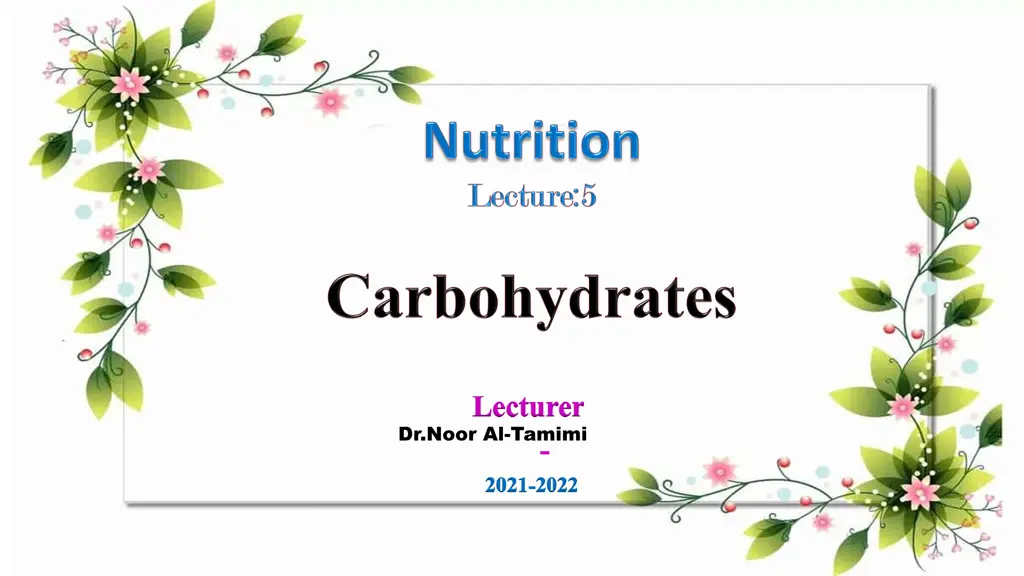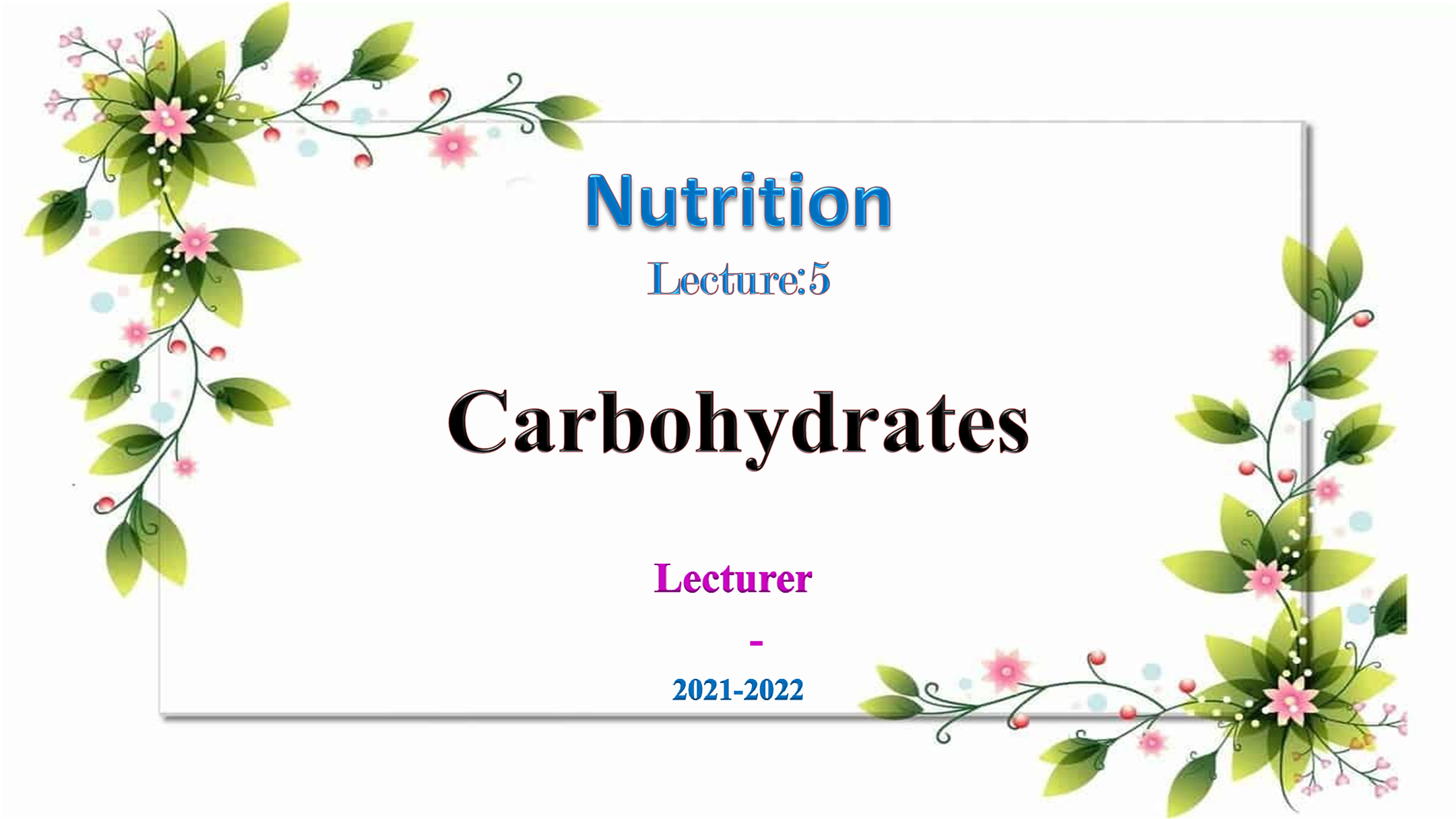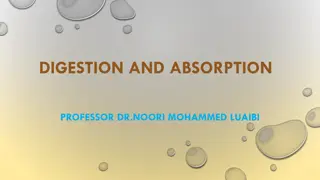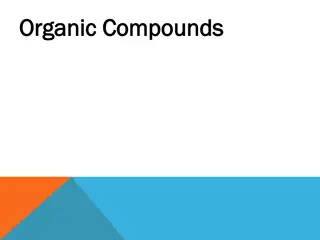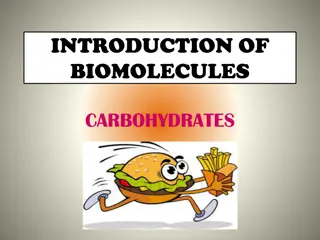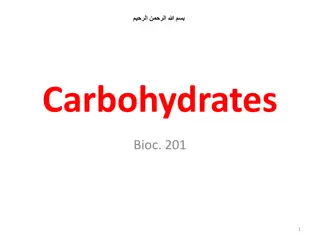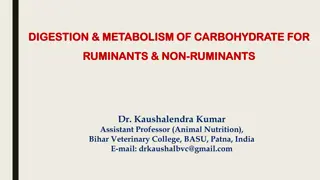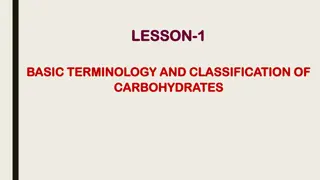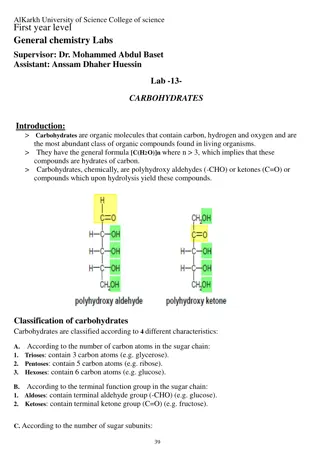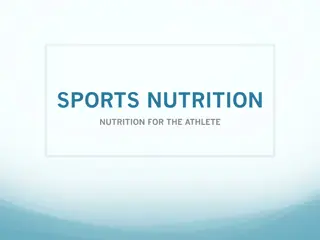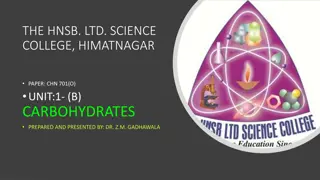Carbohydrates
The functions, sources, storage, and utilization of carbohydrates, as well as the recommended daily intake and health implications of carbohydrate deficiency.
Download Presentation

Please find below an Image/Link to download the presentation.
The content on the website is provided AS IS for your information and personal use only. It may not be sold, licensed, or shared on other websites without obtaining consent from the author.If you encounter any issues during the download, it is possible that the publisher has removed the file from their server.
You are allowed to download the files provided on this website for personal or commercial use, subject to the condition that they are used lawfully. All files are the property of their respective owners.
The content on the website is provided AS IS for your information and personal use only. It may not be sold, licensed, or shared on other websites without obtaining consent from the author.
E N D
Presentation Transcript
Introduction. Definitions, Classification, And RequirementsOf Carbohydrate. Functions, Sources, StorageAnd Utilization Recommended Daily Intake Carbohydrate Deficiency HealthImplications
Introduction ? Carbohydrates are the most abundant organic substances on Earth, comprising approximately 70% of plant structure. They are the main source of the body s energy. ?Sugars, starches, and fiber are the main forms in which carbohydrates occur in food. Starches and sugars are the major source of body energy. They are the cheapest and most easily used form of fuel for the body. Fibrous materials provide bulk and aid digestion.
? Whats most important is the type of carbohydrate you choose to eat because some sources are healthier than others. The amount of carbohydrate in the diet high or low is less important than the type of carbohydrate in the diet. ? Many people are confused about carbohydrates, but keep in mind that it s more important to eat carbohydrates from healthy foods than to follow a strict diet limiting or counting the number of grams of carbohydrates consumed. ? The healthiest sources of carbohydrates unprocessed or minimally processed whole grains, vegetables, fruits and beans . promote good health by delivering vitamins, minerals and fiber. ? Unhealthier sources of carbohydrates include white bread, pastries, sodas, and other highly processed or refined foods. These items contain easily digested carbohydrates that may contribute to weight gain, interfere with weight loss, and promote diabetes and heart disease.
? Although most carbohydrates occur in plant foods, a few are of animal origin. These include glycogen, which is stored in the liver and muscle as a small reserve supply, and lactose (a sugar found in milk). ? Carbohydrates: are macronutrients they contain carbon, hydrogen and oxygen. Carbohydrate one of the basic food groups, are important to a healthy diet.
Forms of Carbohydrates Main Food Sources Glucose Fructose Galactose Fruits, honey, corn syrup Fruits, honey Milk Monosaccharides Sucrose Lactose Maltose Pectin Glycogen Starch and dextrin Cane and beet sugar Milk and milk products Malt products, some breakfast cereals Fruits Meats and sea-food Cereals, grains, legumes & tubers Disaccharides Polysaccharides vegetables Stalks and leaves of vegetables, Outer Cellulose covering of seeds
FUNCTIONS, SOURCES, STORAGE AND UTILIZATION
Functionof carbohydrates 1. Energy Source carbohydrates are the most economical and efficient source of energy, each gram of carbohydrate, as starch or sugar, provides 4 kcal/g. 2. Protein-Sparing Action carbohydrate prevent protein from being used as an energy source and enable fat metabolism. 3. Metabolic Functions under normal conditions, the tissues of the central nervous system (especially the brain) can use only glucose as an energy source. Muscles can use either glucose or fats as fuel. Body fat is used by the muscles only during physical activity varying from walking up stairsto lifting weights. 4. Blood Glucose all forms of carbohydrate except fiber eventually are broken down by the body to glucose. Glucose is the form of sugar found in the blood, and its control at normal blood levels isimportant to health. 5. Dietary fiber acts like a sponge and absorbs water. It helps smooth movement of food waste through the digestive tract and the soft, bulky stools are comfortably eliminated.
Sources: The major food sources of carbohydrate are plants which vary in the amounts of sugar and starches they provide. Milk and milk products containing lactose are the only significant animal sources of carbohydrates. Food sources of carbohydrate include ? cereal grains, ? fruits,vegetables, ?nuts, ?milk, ? sweets.
Storage In general, carbohydrate stores in the body are small. Carbohydrate in excess of the body s energy needs is stored in limited amounts in the liver and muscle. Most excess is converted to fat and stored as such. Less than one pound is stored as glycogen. This amount can furnish energy for 12 to 24 hours.
Utilization: Utilization in the Body the glucose formed by the digestion of the starch and sugar is absorbed mainly into the blood through the walls of the intestine and carried to the liver . The glucose thus absorbed helps to maintain the glucose level in blood and the glycogen stores in the muscle and the liver. Wheneverwe need energy, the glycogen isbroken down to glucose which is oxidised and the energy produced is used by the body. Any excess glycogen isconverted to fat.
Recommended Daily In take ? Recommended Dietary Allowance (RDA) A minimum of 100gcarbohydrates are needed in the diet to ensure the efficient oxidation of fats. Most diets supply more than this amount. Ifthe carbohydrate foods are consumed in excess of the body s need, the excess is converted into fat and is stored as reserve. No daily allowance has been fixed for carbohydrates. ? As it is the cheapest source of food energy, it supplies up to 80 per cent of the calories in the low-cost diets. If the proteins supply about 10 per cent of the calories, fat 20 per cent, then carbohydrates must supply the remaining 70 per cent calories.
Carbohydrate deficiency Not getting enough carbs can cause problems. Without sufficient fuel, the body gets no energy. Additionally, without sufficient glucose, the central nervous system suffers, which may cause dizziness or mental and physical weakness. A deficiency of glucose, or low blood sugar, is called hypoglycemia.
HEALTHIMPLICATIONS Health risksare associated with excessive sugar consumption, but it is difficult to make positive correlations between sugar consumption and the development of many diseases that have been linked to it. Obesity Sugar isoften named as being the cause of obesity. Ifpersons are obese, they certainly have ? consumed excess calories. Cardiovascular disease Except for certain types of lipid disorder, in which an individual exhibits ? abnormal glucose tolerance along with an elevation of blood triglycerides. Diabetes The cause of the malfunction of the pancreas is not known, but heredity plays a role as well ? as obesity. Dental caries Carbohydrates, especially sugar, play a role in tooth decay. ? Cancer ? Fiber Low-fiber diets are believed to play a major role in the onset of diverticulosis and may contribute ? to appendicitis.
